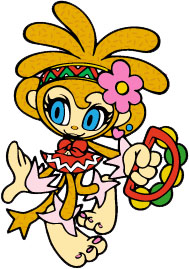
|
Notice: This page is out-of-date and is no longer being maintained. Some of the information may be erroneous and the writing may
be embarrassingly bad. Proceed at your own risk.
|
-- Quick Jump --
[Story |
Gameplay Info |
Stages |
Comparison |
Codes |
Behind the Screens |
Cultural Notes |
Miscellanea]
-- Gameplay Info --
|
Unlike Sonic Team's other upgrades, Samba 2K both adds and subtracts from the original formula. Gameplay
mechanics and goals are all exactly the same as in the original, so to get the scoop on that, check out the
Samba de Amigo museum page. This page just covers the Ver.2000-specific
changes and enhancements.
The most significant addition is the new Hustle mode. Before starting any game, you're given the option
to play in Original mode or Hustle mode. Original mode's the same old same old, but when doing the Hustle, shaking takes a
backseat to swinging. While there's still a bit of rattling to the direction of (green) Rhythm Dama, for the most part
you'll be playing follow-the-leader to Pose's maraca swinging shenanigans. Swinging is exactly what it sounds like: move
one or both maracas back and forth between two of the indicator points at varying speeds, and every once in a while you'll
be prompted to make a complete circle around all six indicators. (When using the standard control pad, "hustling" is done
by rotating the D-pad in the pattern of Pose's swing.)
|

All but two of the original songs is back. "Mas Que Nada" and "El Mambo" are mysteriously missing, but
Sega was able to talk Sony into allowing them to include "The Cup of Life" and "Livin' La Vida Loca." Download songs
notwithstanding, there are fourteen new additions, including "Vamos A Carnaval!" and "Mambo de Verano", two original songs
produced by our main maestros at Wavemaster. Here's the complete song list, with the new additions listed in bold:
|
-- Default Songs --
| |
Vamos A Carnaval!
|
Written by Naofumi Hataya, Tomoko Sasaki; vocals by Josť Alzamora
| |
Volare
|
Written by M. Modugno; vocals by David Bowie
| |
Tout, Tout, Pour Ma Cherie
|
By Michel Polnareff
| |
Hot Hot Hot
|
By Alphonsus Cassell
| |
Salome
|
By Estefano
| |
Tubthumping
|
Written by Nigel Hunter, Bruce Duncan, Alice Nutter, Louise Watts, Paul Greco, Darren Hamer, Allen Whalley, Judith
Abbott; performed by No Smoking (1997)
| |
The Cup of Life
|
By Robi Rosa and Desmond Child
| |
Samba de Janeiro
|
Written by Arito Moreira, Ramon Zenker, Gottfried Engels (1997)
| |
Mambo Beat
|
(aka Al Compas Del Mambo) Written by Perez Prado
| |
Livin' La Vida Loca
|
By Robi Rosa and Desmond Child
| |
-- Hidden songs --
| |
Bamboleo
|
By The Gipsy Kings
| |
Games People Play
|
By Joe South
| |
Mambo de Verano
|
Written by Masaru Setsumaru; vocals by Josť Alzamora
| |
Sway
|
By Gimbel, Ruiz
| |
Take On Me
|
Written by Pal Waaktaar, Magne Furuholmen, Morten Harket; performed by Reel Big Fish
| |
El Ritmo Tropical
|
Music by Claude Morgan (1974)
| |
Love Lease
|
Written by Masao Honda (1998)
| |
Macarena
|
Written by A. Romero, R. Ruiz, C. DeYarza, M. Triay
| |
Djobi Djoba
|
By Collectif Gipsy Kings, Los Reyes
| |
S.O.S.
|
By Robert Uhlmann, C. Zamini
| |
Cha Cha Cuba
|
By Matt Bianco
| |
La Bamba
|
Written by Richie Valens (1958)
| |
Tequila
|
Written by Chuck Rio (1958)
| |
Soul Bossa Nova
|
Written by Quincy Jones
| |
The Theme of Inoki
|
(aka Ali Bombaye) Written by Michael Masser (1977)
| |
Samba de Amigo
|
(Samba de Janeiro 2000) Written by Arito Moreira, Ramon Zenker, Gottfried Engels
| |
The Theme of Rocky
|
(aka Gonna Fly Now) By Bill Conti, Carol Conners, Ayn Robbins
| |
Wedding March
|
By Felix Mendelssohn
| |
-- Download songs --
| |
It Doesn't Matter
|
Sonic Adventure (1998), composed by Jun Senoue
| |
Open Your Heart
|
Sonic Adventure (1998), composed by Jun Senoue
| |
Sonic - You Can Do Anything
|
Sonic CD (1993), composed by Masafumi Ogata
| |
Super Sonic Racing
|
Sonic R (1997), composed by Richard Jacques
| |
Burning Hearts
|
Burning Rangers (1998), composed by Naofumi Hataya
| |
Dreams Dreams
|
NiGHTS into Dreams... (1996), composed by Tomoko Sasaki
| |
After Burner
|
After Burner (1987)
| |
Magical Sound Shower
|
OutRun (1986)
| |
Opa-Opa!
|
Fantasy Zone (1985)
| |
Rent A Hero No.1
|
Rent A Hero (1991)
| |
We Are Burning Rangers
|
Burning Rangers (1998), composed by Naofumi Hataya
| |
My Sweet Passion
|
Sonic Adventure (1998), composed by Fumie Kumatani
| |
Lazy Days
|
Sonic Adventure (1998), composed by Jun Senoue
| |
Let Mom Sleep
|
Jet Set Radio (2000), composed by Hideki Naganuma
| |
Let's Go Away
|
Daytona USA (1994), composed by Takenobu Mitsuyoshi
|
To the terror of Samba fans everywhere, the feared Challenge mode returns, and it's badder than ever.
(God, just let me DIE!) Sure, it doesn't seem so bad at first... it's not easy, but no harder than the original Challenge
mode from Samba 1. Until, of course, you actually clear what seems to be the entire series of challenges. In Samba
1, this rewards you with the game's credits -- not much, but at least your torment was over and you had bragging rights.
That was back when Sonic Team was kind and merciful. This time around, you unlock a whole new fucking Challenge mode
that's even harder than the first. Welcome, children, to hell.
|
-- Challenge mode --
|
-- Maracas Kids --
1. Vamos A Carnaval! (Original/Easy) with a C
2. Hot Hot Hot (Hustle/Easy) with a C
3. Samba de Janeiro (Original/Easy) with an A
4. Tout, Tout, Pour Ma Cherie (Hustle/Easy) with an A
5. The Theme of Inoki (Original/Easy) with an A
Unlocks: The Theme of Inoki
|
-- Maracas Junior --
1. Mambo de Verano (Original/Normal) with a C
2. Games People Play (Hustle/Normal) with a B
3. Livin' La Vida Loca (Original/Normal) with a B
4. Volare (Hustle/Normal) with 10 or fewer misses
5. The Theme of Rocky (Hustle/Normal) with 100,000 Points
Unlocks: The Theme of Rocky
|
-- Maracas Idol --
1. The Cup of Life (Original/Normal) with an A
2. Salome (Hustle/Normal) with an A
3. Djobi Djoba (Hustle/Normal) with 500,000 Points
4. Mambo Beat (Hustle/Normal) with an A
5. Wedding March (Original/Normal) with an A
Unlocks: Wedding March
|
-- Maracas Star --
1. Sway (Hustle/Hard) with a C
2. El Ritmo Tropical (Original/Normal) with 600,000 Points
3. S.O.S. (Hustle/Normal) with an A & 98%
4. Samba de Amigo (Hustle/Normal) with a Perfect
5. Hot Hot Hot (Original/Normal) with a Perfect
Unlocks: Survival mode
|
-- Maracas Hero --
1. Bamboleo (Hustle/Hard) with an A
2. Tout, Tout, Pour Ma Cherie (Original/Hard) with an A
3. Tubthumping (Original/Hard) with a Perfect
4. Mambo de Verano (Hustle/Hard) with a Perfect
5. Vamos A Carnaval! (Original/Hard) with a Perfect
Unlocks: Ura Challenge mode, credits
|
And if you think clearing all that makes you badass, try this little number:
|
-- Ura Challenge mode --
|
-- Maracas Kids --
1. Take On Me (Original/Normal) with a Perfect
2. Hot Hot Hot (Hustle/Normal) with a Perfect
3. Tout, Tout, Pour Ma Cherie (Original/Normal) with a Perfect
4. Macarena (Original/Normal) with a Perfect
5. The Theme of Inoki (Origina/Normal) with a Perfect
|
-- Maracas Junior --
1. Mambo de Verano (Original/Random) with an A
2. Games People Play (Original/Hard) with an A & 98%
3. Bamboleo (Hustle/Normal) with a Perfect
4. Salome (Original/Hard) with 1 or fewer misses
5. The Theme of Rocky (Hustle/Hard) with 800,000 Points
|
-- Maracas Idol --
1. El Ritmo Tropical (Hustle/Hard) with 1 or fewer misses
2. Sway (Original/Hard) with 1 or fewer misses
3. Djobi Djoba (Original/Hard) with a Perfect
4. La Bamba (Hustle/Hard) with a Perfect
5. Wedding March (Original/Hard) with a Perfect
|
-- Maracas Star --
1. S.O.S. (Original/Random) with a Perfect
2. Vamos A Carnaval! (Original/Super Hard) with a B
3. Love Lease (Original/Super Hard) with an A
4. Samba de Amigo (Hustle/Super Hard) with an A
5. Soul Bossa Nova (Original/Super Hard) with an A
|
-- Maracas Hero --
1. Mambo de Verano (Original/Super Hard) with a Perfect
2. Salome (Original/Super Hard) with a Perfect
3. Volare (Original/Super Hard) with a Perfect
4. Djobi Djoba (Original/Super Hard) with a Perfect
5. S.O.S. (Original/Super Hard) with a Perfect
|
The Survival mode, unlocked after clearing the Maracas Star level in Challenge mode, is the mother of
videogame endurance tests. You start what on the surface seems to be a normal Original mode game, where you can choose any
one of the songs you've unlocked or downloaded. Once you begin, however, you'll note that you have a life bar represented
by a line of maracas. You'll also note that every time you miss a beat, the life bar shrinks. When your life bar hits
empty, it's game over. The object is to clear through as many songs as you can on the same life bar. Now, if you're a
reasonably experienced player (and you'd have to be to unlock Survival mode in the first place), you're in for a bitch
workout. (Unless you're using the regular controller, of course, in which case I have nothing to say to you.)
The Mini-Game mode is back, but gone are the five timed challenges of the original. Instead, the lot of
them are replaced with a single sub game: volleyball. Amigo's making his way through five increasingly difficult opponents
(Linda, Bingo & Bongo, Chumba & Wamba, Rio, and Pose) in a bizarre volleyball marathon. The screen is divided into two
segments with a net right down the middle. All you see of your character are two floating hands: one is controlled with the
left maraca, one with the right. Move the maracas around to move the hands. The rules are just like real volleyball: don't
let the ball hit the ground on your side of the net, and you can only touch it three times. You can simply knock the ball
around by moving the maracas around, or you can spike it by shaking the maraca as you hit the ball. In order to do the
power spike technique: when the ball is on your side of the net, shake one maraca until that hand starts flashing, then hit
the ball with the flashing hand to send it exploding into your opponent's side. This technique is nigh unblockable, and is
the only trick later opponents will fall for.
The 19 artificial maraca sound effects of the original are back, but this time you don't need to meet any
requirements to unlock them. There are also 9 different noises you can apply to Hustling: the default is Hi, with
additional selections including Viva, Samba, Wao, Ha, Soiya, Yeah, Hey, Whistle, and Love.
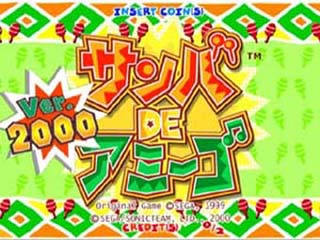
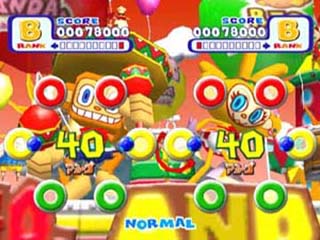
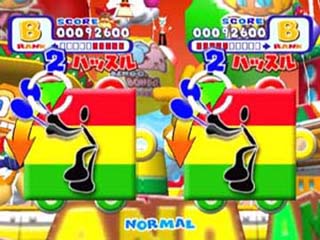
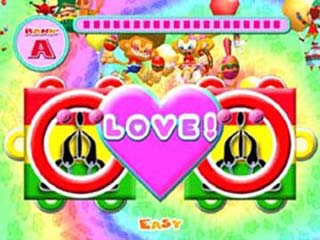
That's all the new stuff, but the transition from Samba to Samba 2K was not without casualties. As
pointed out above, the inexplicable absences of "Mas Que Nada" and "El Mambo" from the song list are notable mentions.
While the ever-popular Love Love mode returns in all its horny glory, the Battle mode is reduced to a memory. The five
mini-games of the Party mode are history, replaced with a single (rather uninspiring) volleyball game. While the
enhancements mostly make up for the losses, it's kind of odd to make an 'upgrade' which removes cool old features that
didn't disrupt the balance.
-- Codes --
Super Hard Mode -- At the difficulty selection screen, shake the left maraca 15 times high.
Random Mode -- At the difficulty selection screen, shake the left maraca 15 times low.
-- Cultural Notes --
There Goes the Bride: The Wedding March (not to be confused with Wagner's "Bridal Chorus") was composed in the
1800's by Jakob Ludwig Felix Mendelssohn-Bartholdy as incidental music for A Midsummer Night's Dream. It became popular as
a recessional at marriage ceremonies after Mendelssohn's death in 1858. Why it is featured in Samba de Amigo Ver.2000 is
anybody's guess.
Rocky Road: The Theme of Rocky, "Gonna Fly Now," is literally the theme song to the original 1976 boxing flick,
Rocky. In the movie, an underdog Italian-American boxer named Rocky Balboa (Sylvester Stallone) faces the fight of
his life against heavyweight champion Apollo Creed. The match is set up as a bicentennial publicity stunt by Apollo's
managers, who assume the fight will be a sure thing against such a born loser as Rocky. But "born loser" Rocky trains
viciously for the impending match, and although he ultimately loses in a split decision by the judges, he fights with the
heart of a champion. The movie became a smash hit, receiving 3 Academy Awards and earning a permanent place in America's
pop culture.
Rolling Start: In 1994, Sega released an arcade racer utilizing their state-of-the-art Model 2 board. The game was
Daytona USA, which would become the spiritual successor to OutRun, particularly in its catchy music. Let's Go Away is
the game's main theme.
Jet Set: Smilebit broke all the rules and made their own with the hip, stylized Jet Set Radio for the Sega Dreamcast.
Players control members of the GG's, a street gang in a future Tokyo where off-the-wall skating separates the cool kids
from the wannabes. With a stylized cel-shaded look and a hip soundtrack to match, JSR turned into a cult hit that has
become synoptic with the entire Dreamcast era in the same way that NiGHTS symbolizes the Saturn. Let Mom Sleep is the
game's showcase theme song.
Written content and original graphics copyright © 1997-2005 Jared Matte. Hosting and administration thanks to Nathan Tsui. Samba de Amigo characters,
logos, and images are trademarks of SEGA Corporation. The GHZ is an independent fansite and is not affiliated with SEGA
Corporation.
|







